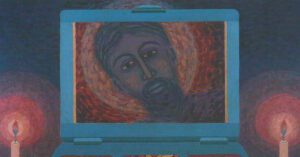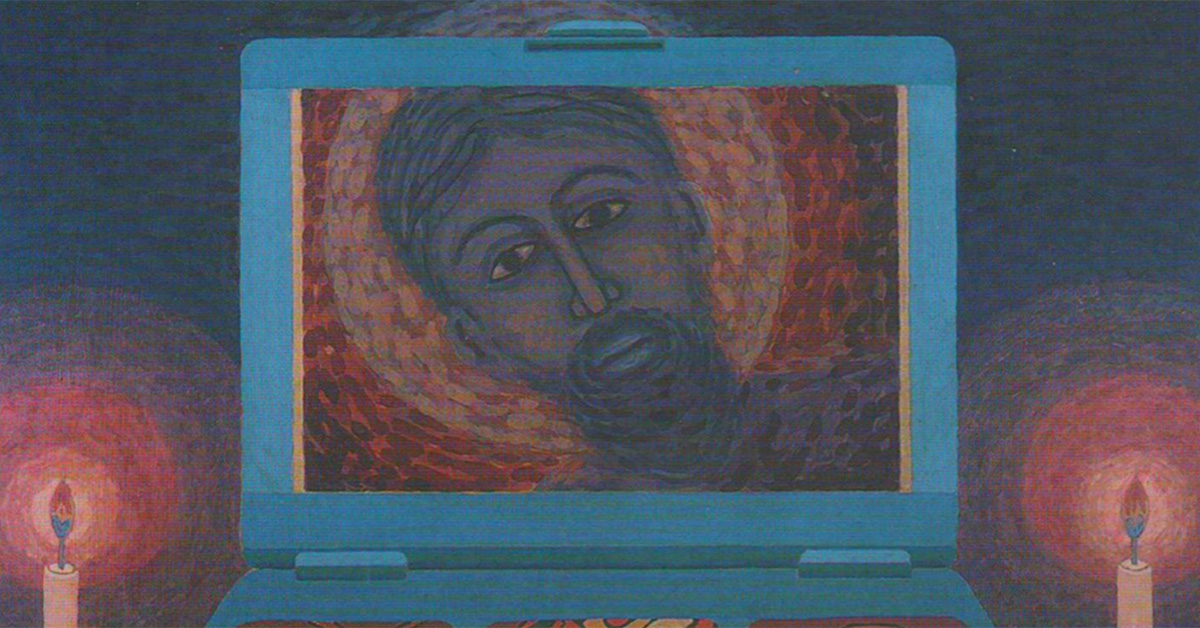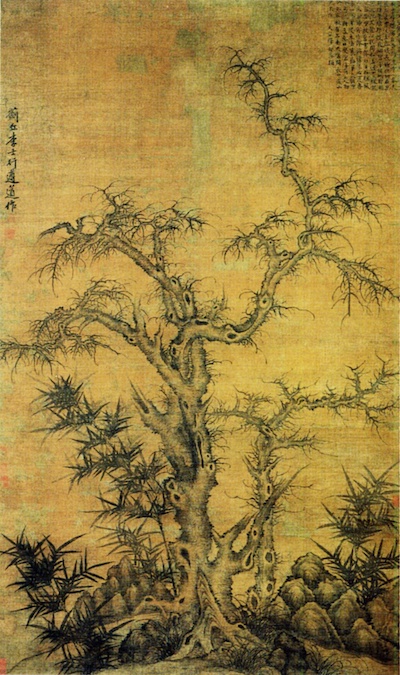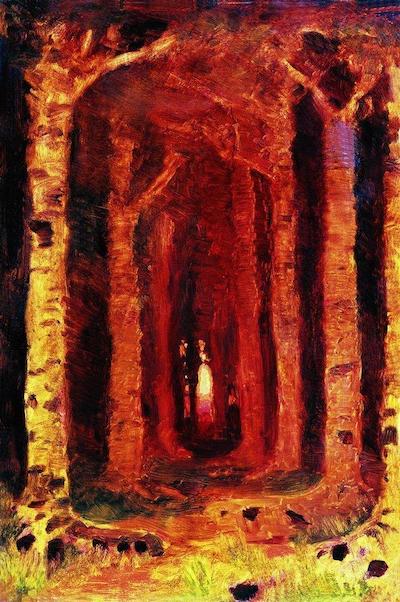

Mark Roques is a philosopher and storyteller who works for Thinking Faith Network.
Tokusan (780–865) was a tough and cantankerous Chinese Zen master. He wielded a menacing bamboo stick. His Zen pedagogy was known as “Tokusan’s thirty blows.” Tokusan would harangue his disciples: “If you speak rightly, I will give you thirty blows. If you speak wrongly, I will also give you thirty blows.”
Tokusan was not noted for his wit and bonhomie.
Does Zen nurture the wise stewardship of bamboo trees? By the way, some species of bamboo can grow up to 2.9 feet per day which is incredible.
Zen teachers deploy paradoxical koans to provoke disciples to find enlightenment (satori). A Zen master was once asked about the purpose of Zen and he summoned this enigmatic koan: “The withered tree is giving a dragon’s roar.”
How do we make sense of this?
The Diamond Sutra, beloved of Zen mystics, proclaims that ultimate reality is the “void” or “emptiness.” This view that everything is in radical flux evokes the philosophy of the Ionian thinker Heraclitus (c. 535–475 BC) who was a contemporary of the Buddha (563–483 BC). Nothing is permanent. This worldview radically rejects biblical teaching about God’s good creation. In this silent, empty, desolate realm there are no individual creatures or bamboo trees at all. Angels, stars, planets, mountains, trees, birds, humans do not exist as distinct entities.


Scripture reveals that while humans are related to and even share some DNA with plants, birds, animals and viruses like COVID, they are distinct creatures. This perspective urges us to examine a bamboo tree and say: “I admire this dynamic tree for growing so fast but I am not this tree.”
Through a biblically-informed worldview we recognise bamboo trees as the handiwork of God and we serve them by honouring their created goodness (Gen 2:15). We delight in these trees because they have been created by and for Jesus Christ (Col 1:16). Bamboo trees are truly remarkable and we flourish by tending the garden with wisdom, care and love.
Zen, however, instructs us that normal, everyday thinking causes pain, despair and suffering. The Buddhist doctrine of no-self proclaims that the illusion of a permanent self is devastating. The false belief that I exist as a separate self fans the flames of desire and craving which leads to suffering. Zen Buddhists believe that we must escape from this erroneous way of looking at the world.
Zen teaches that there is a solution to this misery and this is why Tokusan insisted on beating his nervous students with his bamboo stick. Tokusan wanted to shock his disciples and challenge the logical point of view. He was trying to show his followers the folly of so-called “dualistic” thinking (it’s either this or that) and the misery that this spurious thinking brings. For the enlightened ones there are no menacing bamboo sticks. There are no individual persons like you and me.
Zen takes us to a realm where logic no longer applies because everything has fused into a timeless and formless reality. According to the Zen scholar D. T. Suzuki (1870–1966), Zen obliterates God, minds and even the distinction between good and evil. When we stop thinking in this “dualistic” way and acknowledge that everything is an illusion then we are liberated from fear and suffering.
This is the purpose of Zen meditation, also known as Zazen meditation. As we meditate, we slip into a formless, boundless realm where all distinctions melt away. Some mystics call this “oneism”; others call this pantheism (God is everything). Trees become fused with us. Eventually after much dogged, spiritual labour we vanish into a mystical unity where our thoughts and egos no longer constrain us.

In order to deepen our grasp of Zen it is helpful to think about how soldiers behave in the white heat of battle. Some Buddhists are very concerned about the taking of life. On this view, killing a mosquito, a rat or a human is fundamentally misguided. Zen presents a very different perspective. In his book, Zen and Japanese Culture, D. T. Suzuki quotes this passage from the Zen master Takuan (1573–1645):
“The uplifted sword has no will of its own, it is all of emptiness. It is like a flash of lightning. The man who is about to be struck down is also of emptiness, and so is the one who wields the sword. None of them are possessed of a mind which has any substantiality. As each of them is of emptiness and has no “mind” (kokoro), the striking man is not a man, the sword in his hands is not a sword, and the “I” who is about to be struck down is like the splitting of the spring breeze in a flash of lightning.” (1)
In this revealing passage we can discern the antinomian features of Zen. When a soldier is enlightened by Zen he crawls into a world where he no longer exists. The enemy soldier disappears into a mystical nothingness. The sword is also an illusion. This is why Zen can nurture a mindless attitude to brutal warfare.
Zen urges us to avoid careful moral reflection as we inflict bamboo torture upon the terrified enemy who is screaming in agony. Zen disciples act intuitively, impulsively, going with the silent, empty flow (remember Heraclitus). Logic and careful reflection can only enslave us to a deceiving and “dualistic” way of viewing reality.
Suzuki put it pithily: “Without the sense of an ego, there is no moral responsibility, but the divine transcends morality.”(2)
Why does this matter? The New Testament proclaims that death has been swallowed up by Christ’s glorious resurrection (1 Cor 15:54–55). Zen declares that death is swallowed up in mystical “oneism.” Life and death are both illusions.
Traditional forms of Buddhism (3) do not go as far as this. Many Buddhists believe in karma and reincarnation. They believe that rebirth can lead to four possible destinations: hell, earth, heaven and nirvana. This teaching can be found in the Dhammapada. For Zenists this view is still anchored in a form of “dualism” which denies “oneism.” When we talk about rebirth and the thousands of lives that we must live before we find nirvana (salvation) we are still making naïve, jejune distinctions about time and karmic bondage. The Diamond Sutra tells us to stop doing this.

A Zen master was once asked if he believed that Auschwitz was evil. He looked despondent as he replied sheepishly: “To be honest I can’t say that what the Nazis did was evil. To say that would be to affirm dualism. As a Buddhist I can’t do that.”
Without doubt many Buddhists often show exemplary moral character and Buddhist sacred texts call for the cultivation of virtues like self-control and compassion. However, there is a deep tension between such moral obligations and the belief in the “void” where all ethical distinctions have vanished.
This brief outline of Zen Buddhism can establish this firm conclusion.
If we are committed Buddhists, why should we care about bamboo trees if they do not exist?
The Kirby Laing Centre for Public Theology in Cambridge. Charity registered in England and Wales. Charity Number: 1191741
Kirby Laing Centre, Office 1, Unit 6, The New Mill House, Chesterton Mill, French’s Road, Cambridge, CB4 3NP
© 2025 The Kirby Laing Centre for Public Theology in Cambridge